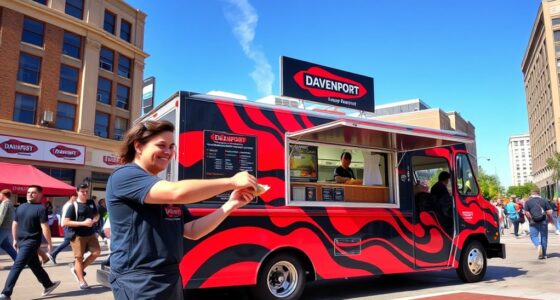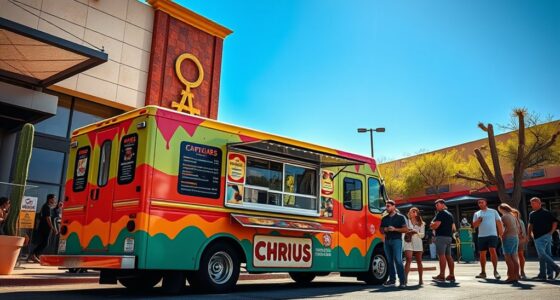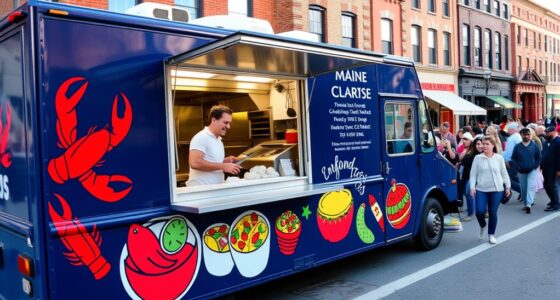To open a food truck in Greenville, SC, you’ll need to secure permits like a business license, vehicle registration, and health permits, along with background checks. Expect costs from $15,000 for used trucks to over $150,000 for new, plus licensing, insurance, and outfitting fees. Choose approved locations and follow zoning rules. Developing a focused menu and strong marketing plan will boost your success. Keep exploring to uncover detailed steps that help bring your food truck vision to life.
Key Takeaways
- Obtain necessary permits, including Greenville business license, mobile food vendor approval, background checks, and DHEC permits.
- Budget for vehicle costs ($15,000–$150,000), outfitting ($20,000–$40,000), licensing ($2,700–$20,000/year), and initial inventory ($2,000–$3,000).
- Operate on approved private properties or designated public zones; residential operation requires special permission and compliance with zoning laws.
- Develop a focused menu of 5–15 quick-prep items, emphasizing quality, appeal, and cost-effectiveness for efficient service.
- Use digital marketing, social media, and location visibility to attract customers and build a loyal customer base in Greenville.
Navigating Permits and Licensing Procedures in Greenville
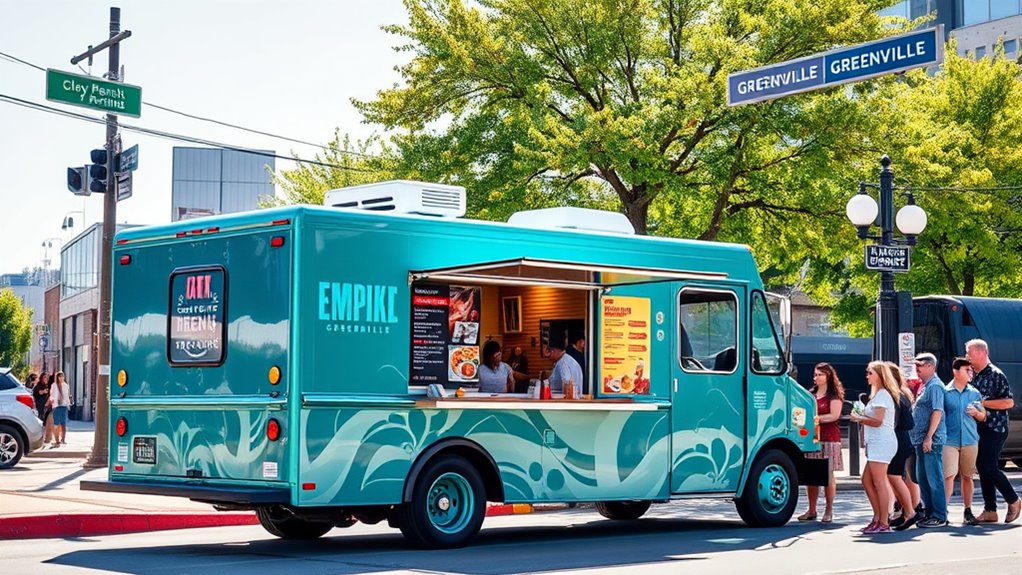
Steering permits and licensing procedures in Greenville requires careful attention to application requirements and deadlines. You’ll need to submit both a City of Greenville Business License Application and a Mobile Food Vendor Vehicle Application. A background check is mandatory for the owner(s) and manager(s), along with copies of DHEC permits, vehicle registration, and valid driver’s licenses. Additionally, you must provide a 10-year certified driving record for the owner(s). To get approved, you’ll need multiple color photos of your vehicle’s interior and exterior. The business license, valid from May 1 to April 30, must be renewed annually before May 1 to avoid penalties. Payments, including a 2.65% service fee for card transactions, are made through Greenville’s online portal, where you can also use license calculators. Obtaining federal and state business registration ensures compliance with tax and legal requirements for your food truck business. It’s also important to familiarize yourself with Greenville’s specific food truck permitting process to streamline your application.
Understanding Vehicle and Food Safety Regulations

Ensuring your food truck meets vehicle and food safety regulations is essential for legal operation and customer trust. You must comply with South Carolina Department of Agriculture (SCDA) standards, ensuring your vehicle has proper refrigeration, sanitation, and waste disposal systems. Installation of approved plumbing, handwash stations, and fire extinguishers is mandatory, along with adherence to fire safety rules. Regular inspections verify compliance with safety standards before you get permits. You need to follow strict food handling protocols, including employee hygiene, safe storage, and pest control. Your truck must display active permits visibly and meet requirements for temperature control and sanitation equipment. Using certified refrigeration, NSF-approved tools, and proper waste management helps prevent contamination. Non-compliance can lead to fines, permit suspension, or closure, so staying up-to-date is critical. Additionally, the city of Greenville requires vendors to submit documentation such as background checks, driving records, and health permits to ensure safety and compliance before operating.
To further ensure compliance, it’s also important to stay informed about vehicle safety standards and any updates issued by local authorities, which can impact your operating procedures.
Estimating Costs and Managing Financial Responsibilities

Estimating costs and managing financial responsibilities are critical steps in launching your food truck business. You’ll need to budget for vehicle expenses, which range from $15,000 for used trucks to over $150,000 for new. Outfitting the truck costs between $20,000 and $40,000, with branding adding up to $15,000. Licensing, permits, and insurance can total $2,700 to $20,000 annually, depending on coverage and local fees. Initial inventory runs about $2,000 to $3,000, and ongoing costs like fuel, wages, and utilities add up monthly. To better understand your finances, review this outline: contrast ratio can also influence customer perception of your food presentation and overall brand image.
| Expense Category | Range | Notes |
|---|---|---|
| Vehicle | $15,000–$150,000+ | Purchase or lease |
| Permits & Insurance | $2,700–$20,000 | Annual costs |
| Operating Costs | Variable | Fuel, wages, utilities |
Selecting Approved Locations and Zoning Compliance
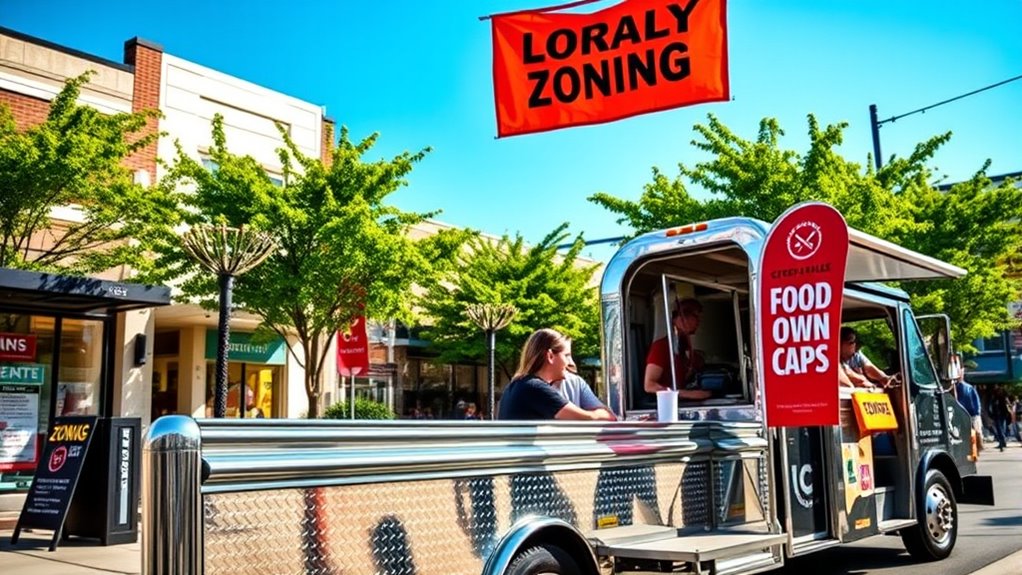
Choosing the right locations for your food truck in Greenville involves understanding city regulations and securing proper approvals. You need to operate on approved private properties or designated public zones, confirmed through city licenses. Be aware that operating in residential neighborhoods requires special permissions, and stationary trucks are generally prohibited unless temporary. Check the Greenville mobile food vendor office’s list of approved locations regularly to guarantee compliance. The new ordinance allows food trucks in residential neighborhoods that are two acres or larger, provided all conditions are met. Operate on licensed private property city-wide. Use city-designated locations, updated periodically. Obtain permits for public or private event zones. Verify and display current Greenville licenses. Ensure zoning rules are followed, especially in residential areas. Additionally, understanding zoning compliance is essential for maintaining legal operation and avoiding penalties.
Crafting a Menu and Developing Effective Marketing Strategies

Crafting a menu and developing effective marketing strategies are essential steps to attract and retain customers for your Greenville food truck. Start by defining your concept—whether it’s gourmet burgers or street tacos—and narrow your menu to 5-15 items that reflect your brand. Focus on dishes that can be prepared quickly, using overlapping ingredients to streamline prep and reduce waste. Organize your menu with clear categories, highlighting popular or high-margin items, and keep prices simple and easy to read. Use descriptive language and visual cues to enhance appeal and guide choices. Incorporate digital updates and social media promotions to boost visibility. Make certain your menu supports fast service, simplifies preparation, and builds customer loyalty through branding and storytelling.
Frequently Asked Questions
How Long Does the Entire Permitting Process Typically Take in Greenville?
You’re wondering how long the permitting process in Greenville takes. It usually spans several weeks to months, depending on how complete your application is, how quickly you respond to any requests for additional info, and scheduling inspections. Planning ahead, submitting thorough documents, and consulting early with city officials can help speed things up. Keep in mind, delays may happen if there are any infractions or environmental concerns.
Are There Specific Vehicle Modifications Required for Greenville Food Trucks?
You’ll need to make specific vehicle modifications to meet Greenville’s safety standards. Install front and rear swing arms to prevent pedestrian access, and guarantee your cooking appliances have proper exhaust hoods that vent fumes safely. Keep at least 10 feet between your truck and other structures, and add fire suppression systems that are regularly serviced. Also, secure LP or CNG gas containers, and install methane alarms if using natural gas.
What Are the Insurance Requirements for Operating a Food Truck in Greenville?
Think of insurance requirements like a safety net you can’t see until you fall. In Greenville, you’ll need at least general liability and commercial auto insurance to protect against accidents and damages. If you serve alcohol or hire staff, add liquor liability and workers’ comp. Make sure your policies meet South Carolina’s minimum limits, and consider extra coverage like equipment or product liability to keep your food truck business secure.
Can I Operate My Food Truck at Multiple Locations Simultaneously?
You can operate your food truck at multiple locations simultaneously, but you need to meet specific requirements. Each site requires its own permits, including a retail license, health inspections, and possibly temporary use permits. You must also guarantee your trucks stay mobile, with proper insurance and compliance with Greenville’s regulations. Planning logistics carefully, managing staff, and securing approvals for each location are essential to successfully run multiple sites at once.
Are There Restrictions on Serving Alcohol From a Food Truck in Greenville?
You should know that serving alcohol from a food truck in Greenville, SC, comes with strict restrictions. You need a valid ABC permit and a business license, and alcohol can only be served on approved, location-specific premises. You must follow state and local laws, including health and safety regulations, and collect the 2% hospitality tax. Serving alcohol outside designated areas or in public spaces without proper permissions is prohibited.
Conclusion
So, now you’re all set to conquer Greenville’s food truck scene—just remember, permits are like that clingy ex you can’t shake, and zoning laws are the ultimate buzzkill. But hey, with a killer menu and marketing magic, you’ll be the talk of the town in no time. Who knew starting a food truck was as simple as steering through a maze of paperwork? Go ahead, turn those regulations into your secret sauce!


